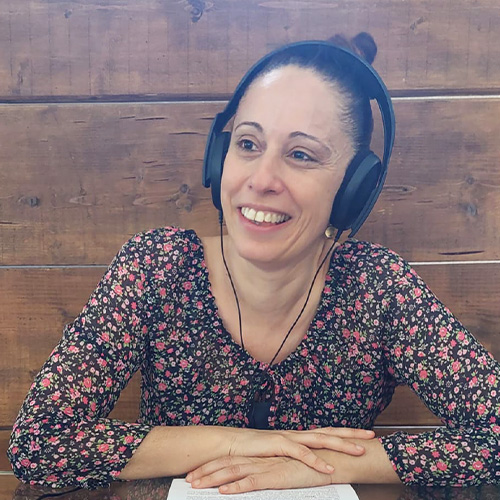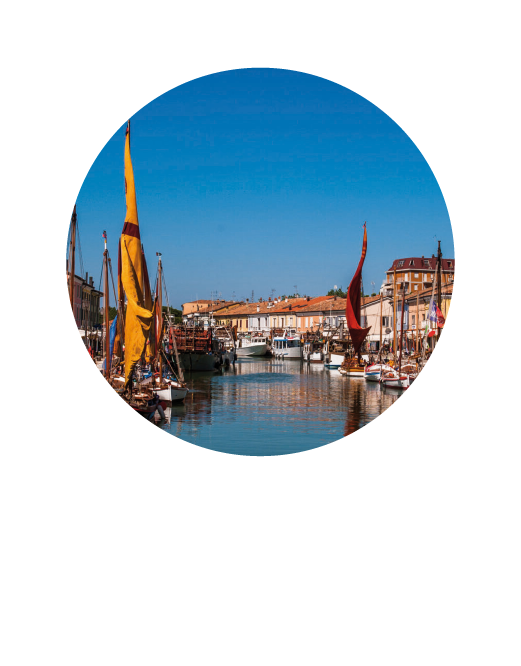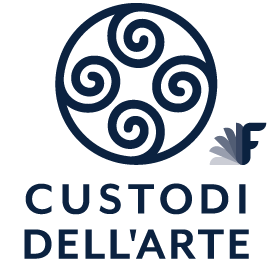

Marino Moretti’s House
Marino Moretti’s House
Riproduci traccia audio
Play audio track
Audio-Track abspielen
Marino Moretti’s House
Trascrizione traccia audio
Painted green and matching the water of the port, this house belonged to Marino Moretti, poet, novelist, short story writer and diarist, someone of whom Cesenatico is very proud.
It has the appearance of a typical fisherman’s house: the façade is sober and rather narrow, but inside it is longer than the other houses, connecting the port with Cesenatico’s neoclassical theatre directly behind.
When I was little, I often passed by here and as soon as I started reading, I was intrigued to read the inscription on the plaque, outside the house and the phrase “here he cultivated his secret garden”. The plaque commemorates Marino and his sister Ines, who, in 1980, donated the house to the town of Cesenatico.
I dreamt about ringing the bell and going inside!
For years I imagined this garden. I thought there would be a large open space with a lawn edged full of flowers. However, when I finally entered for the first time, on a trip with my middle school, I understood that it really was “secret” full of precious objects: plants that had belonged to Marino’s mother, a well, Renaissance-inspired ceramics on the walls and Moretti’s tortoise, named Cunegonda. This enclosed garden is surrounded by its embracing walls, and, if you go through the woodshed at the bottom of the garden, it leads you to the theatre’s square.
I never thought that one day this place would become so loved and familiar to me. However, ever since 2017, I can often be found working at Marino Moretti’s house.
I find myself, on a hot summer’s day, as always collecting the keys to the house. I put them in the lock, open the door and enter, without the need to ring. It is as if you, Marino, were there waiting for me: I enter the dimly lit corridor, which you loved to call the “Gallery of Friendship”, from where you can see the French doors that lead on to the garden; the prints that your friends brought for you as gifts, are carefully hung on the walls. On the left I can see the library, on the right the dining room with its austere furniture and then, just before the kitchen, I climb the staircase, scattered with images of places near and far.
After looking at your bedroom I find myself in the large room on the other side of the landing, where, in my opinion, we find the most precious object of all: a tall, narrow table, your desk.
I imagine you sitting at the desk with the tools of your trade arranged in good order – the nib, the inkwell, the scissors… I would love to open those bottles of ink lined up on the desk and smell their scent. In the corner there are more memories and a photo of your dear mother, Filomena.
It is a sunny afternoon and I imagine that you, Marino, have approached the window shutters, you hear the fishermen, see the passing boats, sometimes the horses that have come from the countryside, and then there’s the roar of the cars, because it is only in recent times the port has been pedestrianised. They say you moaned when the world began to change.
Today, in the summer season, everything is immersed in silence until late afternoon, very few people walk along the port during the hottest hours of the day. If there is a light breeze, there is a gentle rocking of the boats with their colourful sails moored here in front of the house.
When the bell rings I jump, as if it is a guest that you, Marino, were waiting for.
The shutters of your studio remain ajar until half past five, and finally, when I open them, it seems that the house gradually awakens and unravels. The scent of fried fish begins to rise from outside, the carousel lights up in Piazza Pisacane, people arrive for an aperitif, then for dinner. It’s evening and the port comes alive again with lights and noise!
It is then that your secret garden is opened to the town, it resonates with poems and music.
When the last guest has left, I close the windows and I lock the front door, knowing that the house is here, waiting for us to take care of it for another day.
Audio Track transcription
Painted green and matching the water of the port, this house belonged to Marino Moretti, poet, novelist, short story writer and diarist, someone of whom Cesenatico is very proud.
It has the appearance of a typical fisherman’s house: the façade is sober and rather narrow, but inside it is longer than the other houses, connecting the port with Cesenatico’s neoclassical theatre directly behind.
When I was little, I often passed by here and as soon as I started reading, I was intrigued to read the inscription on the plaque, outside the house and the phrase “here he cultivated his secret garden”. The plaque commemorates Marino and his sister Ines, who, in 1980, donated the house to the town of Cesenatico.
I dreamt about ringing the bell and going inside!
For years I imagined this garden. I thought there would be a large open space with a lawn edged full of flowers. However, when I finally entered for the first time, on a trip with my middle school, I understood that it really was “secret” full of precious objects: plants that had belonged to Marino’s mother, a well, Renaissance-inspired ceramics on the walls and Moretti’s tortoise, named Cunegonda. This enclosed garden is surrounded by its embracing walls, and, if you go through the woodshed at the bottom of the garden, it leads you to the theatre’s square.
I never thought that one day this place would become so loved and familiar to me. However, ever since 2017, I can often be found working at Marino Moretti’s house.
I find myself, on a hot summer’s day, as always collecting the keys to the house. I put them in the lock, open the door and enter, without the need to ring. It is as if you, Marino, were there waiting for me: I enter the dimly lit corridor, which you loved to call the “Gallery of Friendship”, from where you can see the French doors that lead on to the garden; the prints that your friends brought for you as gifts, are carefully hung on the walls. On the left I can see the library, on the right the dining room with its austere furniture and then, just before the kitchen, I climb the staircase, scattered with images of places near and far.
After looking at your bedroom I find myself in the large room on the other side of the landing, where, in my opinion, we find the most precious object of all: a tall, narrow table, your desk.
I imagine you sitting at the desk with the tools of your trade arranged in good order – the nib, the inkwell, the scissors… I would love to open those bottles of ink lined up on the desk and smell their scent. In the corner there are more memories and a photo of your dear mother, Filomena.
It is a sunny afternoon and I imagine that you, Marino, have approached the window shutters, you hear the fishermen, see the passing boats, sometimes the horses that have come from the countryside, and then there’s the roar of the cars, because it is only in recent times the port has been pedestrianised. They say you moaned when the world began to change.
Today, in the summer season, everything is immersed in silence until late afternoon, very few people walk along the port during the hottest hours of the day. If there is a light breeze, there is a gentle rocking of the boats with their colourful sails moored here in front of the house.
When the bell rings I jump, as if it is a guest that you, Marino, were waiting for.
The shutters of your studio remain ajar until half past five, and finally, when I open them, it seems that the house gradually awakens and unravels. The scent of fried fish begins to rise from outside, the carousel lights up in Piazza Pisacane, people arrive for an aperitif, then for dinner. It’s evening and the port comes alive again with lights and noise!
It is then that your secret garden is opened to the town, it resonates with poems and music.
When the last guest has left, I close the windows and I lock the front door, knowing that the house is here, waiting for us to take care of it for another day.
Audiotrack-Text
Painted green and matching the water of the port, this house belonged to Marino Moretti, poet, novelist, short story writer and diarist, someone of whom Cesenatico is very proud.
It has the appearance of a typical fisherman’s house: the façade is sober and rather narrow, but inside it is longer than the other houses, connecting the port with Cesenatico’s neoclassical theatre directly behind.
When I was little, I often passed by here and as soon as I started reading, I was intrigued to read the inscription on the plaque, outside the house and the phrase “here he cultivated his secret garden”. The plaque commemorates Marino and his sister Ines, who, in 1980, donated the house to the town of Cesenatico.
I dreamt about ringing the bell and going inside!
For years I imagined this garden. I thought there would be a large open space with a lawn edged full of flowers. However, when I finally entered for the first time, on a trip with my middle school, I understood that it really was “secret” full of precious objects: plants that had belonged to Marino’s mother, a well, Renaissance-inspired ceramics on the walls and Moretti’s tortoise, named Cunegonda. This enclosed garden is surrounded by its embracing walls, and, if you go through the woodshed at the bottom of the garden, it leads you to the theatre’s square.
I never thought that one day this place would become so loved and familiar to me. However, ever since 2017, I can often be found working at Marino Moretti’s house.
I find myself, on a hot summer’s day, as always collecting the keys to the house. I put them in the lock, open the door and enter, without the need to ring. It is as if you, Marino, were there waiting for me: I enter the dimly lit corridor, which you loved to call the “Gallery of Friendship”, from where you can see the French doors that lead on to the garden; the prints that your friends brought for you as gifts, are carefully hung on the walls. On the left I can see the library, on the right the dining room with its austere furniture and then, just before the kitchen, I climb the staircase, scattered with images of places near and far.
After looking at your bedroom I find myself in the large room on the other side of the landing, where, in my opinion, we find the most precious object of all: a tall, narrow table, your desk.
I imagine you sitting at the desk with the tools of your trade arranged in good order – the nib, the inkwell, the scissors… I would love to open those bottles of ink lined up on the desk and smell their scent. In the corner there are more memories and a photo of your dear mother, Filomena.
It is a sunny afternoon and I imagine that you, Marino, have approached the window shutters, you hear the fishermen, see the passing boats, sometimes the horses that have come from the countryside, and then there’s the roar of the cars, because it is only in recent times the port has been pedestrianised. They say you moaned when the world began to change.
Today, in the summer season, everything is immersed in silence until late afternoon, very few people walk along the port during the hottest hours of the day. If there is a light breeze, there is a gentle rocking of the boats with their colourful sails moored here in front of the house.
When the bell rings I jump, as if it is a guest that you, Marino, were waiting for.
The shutters of your studio remain ajar until half past five, and finally, when I open them, it seems that the house gradually awakens and unravels. The scent of fried fish begins to rise from outside, the carousel lights up in Piazza Pisacane, people arrive for an aperitif, then for dinner. It’s evening and the port comes alive again with lights and noise!
It is then that your secret garden is opened to the town, it resonates with poems and music.
When the last guest has left, I close the windows and I lock the front door, knowing that the house is here, waiting for us to take care of it for another day.
Narrato da
Narrated by
Mehr Infos



